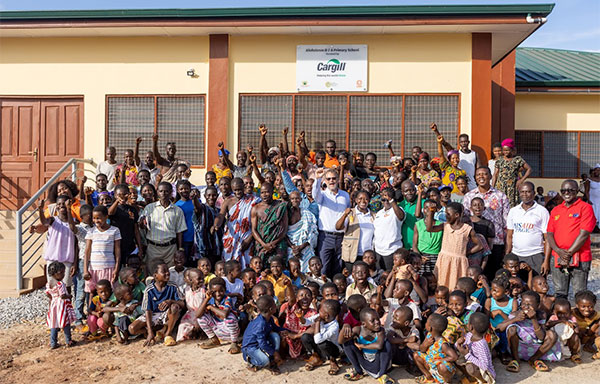Educating children to help whole cocoa communities thrive
In cocoa-growing communities, investing in education pays dividends far beyond the classroom. When children go to school and adults get training, the surrounding communities benefit in myriad ways. Here’s how Cargill has been investing in helping cocoa farmers and their families get educated.
January 23, 2023
The United Nation's International Day of Education is marked each January 24th. This year’s theme is “To invest in people, prioritize education.” That’s a worthy ambition everywhere you look, but at Cargill, it’s aligned with the work we are doing in cocoa-growing communities.
In a sector that has been tackling child labor issues along with other environmental and economic development challenges, improving education means more than keeping children away from unsafe work and giving them a chance to develop their talents. It also means helping adults skill up, helping families prosper, and, ultimately, building thriving, sustainable communities.
Setting students up for success
Cargill’s purpose is to nourish the world in a safe, responsible and sustainable way. One of the ways we do that is through the Cargill Cocoa Promise, our sustainability program for the sector.
So far, the Cocoa Promise has reached more than a quarter of a million farmers in West Africa, Asia and Latin America. With our partners, including local and global NGOs as well as government agencies, we manage more than 100 programs in cocoa-growing communities. Based on our experience, we can confidently say: Quality education is one of the main levers for progress.
That’s why, since 2014, we’ve helped build over 55 schools in the communities of West Africa where we operate, and our commitment to education has grown over the years. Here’s what we did in just in 2022:
-
 In Ghana, we handed over six schools we built in six communities, in partnership with CARE, the Ghana Cocoa Board, Ghana’s Ministry of Education and other local government partners.
In Ghana, we handed over six schools we built in six communities, in partnership with CARE, the Ghana Cocoa Board, Ghana’s Ministry of Education and other local government partners. - In Cameroon, we handed over three newly constructed schools at Endama in Ntui, Ngoro, and Deuk at Bafia to the Cameroon Board of Education.
- In Côte d’Ivoire, we inaugurated eight community schools that will provide access to education for more than 1,000 children. We also announced a national campaign to raise awareness of the importance of education, the prevention of child labor, and the need to obtain birth certificates.
From symptoms to root causes
“Since we launched the Cocoa Promise in 2012, we’ve seen results on the ground confirm our assumption that business can drive social change by tackling the symptoms of issues affecting the cocoa industry to addressing their root causes. And we’ve come to understand how deeply all these issues are interconnected,” explains Samuel Apana, Cargill’s sustainability country lead of the cocoa and chocolate supply chain in Ghana.
Securing birth certificates for children in cocoa-growing communities broadens access to schooling, reduces child labor, and sets students up for economic success later in life, contributing to better opportunities for everyone in the community.
To date, we’ve helped obtain birth certificates for 45,000 children in partnership with the International Cocoa Initiative (ICI). With their birth certificate in hand, they have access to an elementary school education, which opens the path to vocational technical training and higher education later on.
“Children who are in school are at reduced risk of child labor and they also have a safe place to go every day, which gives parents or other adults in their households the opportunity to make extra money for their families or get training to set up their own businesses,” Samuel reflects.
To increase our impact, we’ve partnered with the Government of Côte d’Ivoire, specialized NGOs and fifteen other chocolate companies to form the Child Learning and Education Facility (CLEF). The goal of that collective effort is to provide quality education for 5 million children and influence 10 million parents by 2030.
To achieve that ambition, CLEF aims to bring quality education to 10,000 primary schools and build 2,500 new classrooms and other pieces of education infrastructure, such as pre-schools and lunchrooms, raising more than US$ 175 million in funding.
Adult education
“But education doesn’t stop there. While we’re helping children get a stronger start in life, we’re also helping adults gain a firmer footing. For example, with our Coop Academy program we offer business training for cocoa cooperative leaders,” Apana appoints.
Since 2013, the Coop Academy has trained more than 700 participants from 70 cooperatives in Côte d’Ivoire and Cameroon. Another 700 are expected to graduate this year. The results are transformative. In many cases, cooperatives end up raising their profit margins and producing sustainable cocoa that global food makers value.
Meanwhile, we’re empowering women by helping them improve their financial literacy so they can become entrepreneurs. Working with our partner CARE, we’re supporting them in setting up Village Savings and Loans Associations (VSLAs), which give them access to affordable credit.
According to our latest cocoa sustainability progress report, we’ve established 686 VSLAs in West Africa, helping more than 11,000 women start or expand small businesses and become income generators for their families and communities.
“In the end, these are all interlocking elements of a strategy that aims to build stronger, more resilient cocoa-growing communities. Ideally, the children going to elementary school with their birth certificates in hand today will be tomorrow’s community leaders of the future. What’s certain is that their drive and creativity will be needed, and this will give the young people the opportunity to live up to their full potential. That’s why we believe so strongly in the power of quality education,” Samuel concluded.
